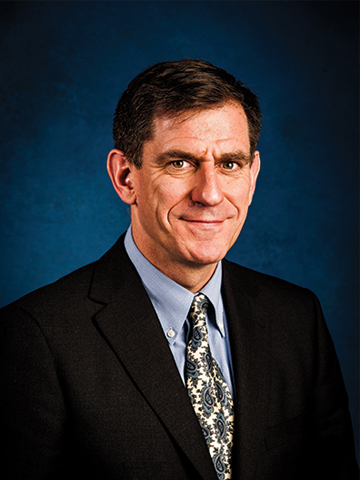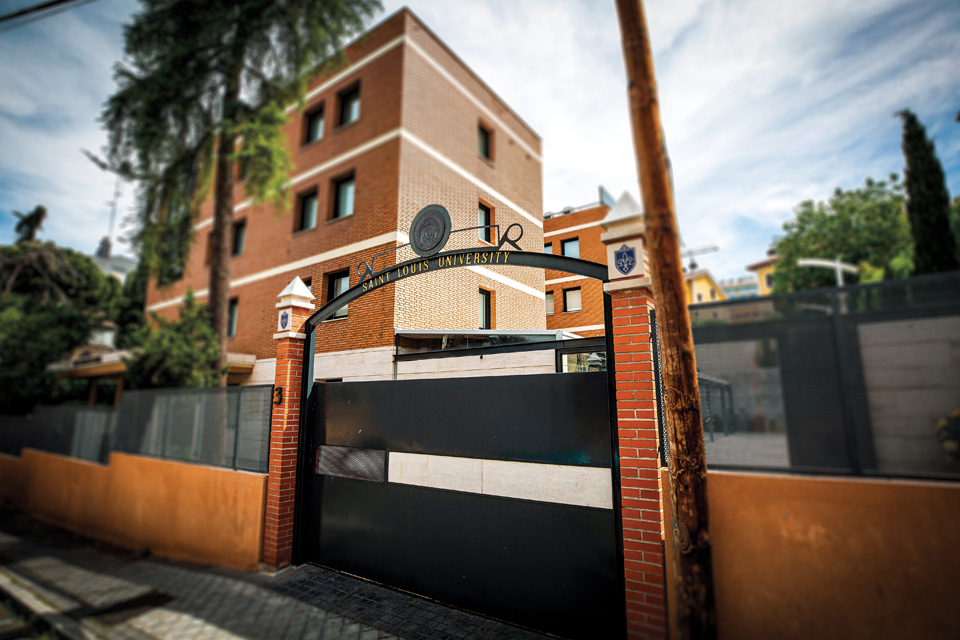A Global Response
As members of the SLU-Madrid community faced the COVID-19 crisis, their efforts showed the power of distance learning.
It was Feb. 26. European cities and countries —namely Italy — were starting to limit travel, close businesses and, effectively, shut down. Meanwhile, the U.S. State Department issued its first health alert for Spain, reminding U.S. citizens that the Spanish Ministry of Health was responding to suspected cases of COVID-19.
Dr. Paul Vita, director and academic dean of Saint Louis University-Madrid, shared the alert with Madrid Campus students, faculty and staff.

“We knew a lot of our study abroad students had their hearts set on spending Holy Week — our spring break — touring Italy,” Vita said. “They were heartbroken to hear that they’d have to change their plans.”
Twelve days later, on March 9, the regional authorities of Madrid announced that all educational institutions — including private universities — must suspend face-to-face classes and on-campus activities within 24 hours.
“By early March, we already knew we were dealing with a crisis and implemented a management plan,” Vita said. “We identified the best sources for accurate information, developed answers to frequently asked questions and communicated to very different audiences — parents, study abroad partners, students, faculty and staff.”
It was a swift process for Vita and his team, who had to shift SLU-Madrid from in-person to remote teaching in just one day for all 997 spring semester students — a record-breaking enrollment.
“Our faculty is already impressive — researchers and scholars deeply committed to teaching,” Vita said. “This disruption mid-semester really made clear the commitment to putting students’ learning first.”
On March 9, the president of Spain declared a state of emergency. Classes met in person for the last time on March 10, with the hope that the suspension might last just 15 days. Nonetheless, Vita was recommending that students whose permanent residence was not in Spain should return to their home countries.
“We weren’t shutting down,” Vita said. “But it was clear that Spain’s situation was going to get worse before it got better.” It did.
Thus, students were widely dispersed when remote versions of SLU-Madrid courses began March 16. And SLU-Madrid became a virtual college campus one week before the University’s St. Louis campus did.
“Very quickly, our students were ‘Zooming in’ for class from nearly every state in the U.S. and around the world,” Vita said.
By March 27, Vita broke the news that SLU-Madrid did not plan to return to face-to-face teaching for the spring semester and that commencement was likely to be postponed. “Spain’s government took important measures to contain the spread of the virus through imposing very strict measures,” he said.
Caring for Students and the Community
In one month, everything had changed. People were craving information. In no time, SLU-Madrid’s online updates were reaching a worldwide audience, with more than 255,000 visits to the campus’ news webpage during March alone.
For the tight-knit community, where hundreds of students each semester are an ocean away from family, campus staff focused on making sure students got home safely.
“We were in close contact with the U.S. Embassy and with the students,” Vita said. While many of the flights back to the United States were delayed or re-routed, every student returned safely. On their return, the students were required to go into self-isolation for 14 days because clearly — both by the time some of them left Spain and en route back to the United States — they were at a high risk of being exposed to COVID-19.
Classes weren’t the only thing to shift to a remote format. Counseling and advising support shifted, too. Students were dealing with anxiety and the stress of travel. Plus, the sudden change from the freedom of mobility — strolling through the streets of Europe — to quarantine in one’s bedroom back at home showed that students needed support.
“Throughout this situation, SLU’s students impressed me,” Vita said. “They were responsible and mature and faced tough, real-life decisions. My sense is that the students studying abroad in spring 2020 learned more about themselves and their connection to global issues than any other group could.”
As staff worked to assist students and faculty adapted to online teaching, SLU-Madrid’s commitment to service shined through. After the campus began virtual instruction, Dr. Tania de la Fuente, program director for health sciences, spearheaded an effort to donate the gloves, goggles, antibacterial gel and disposable laboratory coats used in the SLU-Madrid laboratories for use at Cottolengo del Padre Alegre, an assisted living facility and nursing home for economically disadvantaged adults with disabilities located on the outskirts of Madrid.
“Even the smallest gesture is important. The equipment in storage on campus can help medical professionals be safe as they care for others,” Vita said. “SLU-Madrid remains committed to serving others, especially during these difficult times.”
Summer and Beyond
Campus leaders also remain committed to plotting the future, despite the uncertainty. In late April, it was announced that all of SLU-Madrid’s summer courses would be offered online.
“All courses will be taught asynchronously (as opposed to livestreamed) to accommodate learners from all over the globe and in different time zones,” explained Katherine Smith, a SLU-Madrid English as a Second Language professor who is teaching this summer. “Students are able to interact with our international community at their own pace and according to their local timetables.”
While SLU-Madrid’s summer sessions normally serve visiting students whose academic programs or athletic commitments prevent them from studying abroad during the traditional academic year, this summer’s programming also is meeting the needs of degree-seeking students catching up on needed credits.
“Summer courses by SLU-Madrid faculty are interesting options for students who wish to continue to work toward their degree,” Vita said. “We will maintain the same rigor and quality in our online courses and ensure that our permanent students can earn the credits they need this summer.”
As for the fall, the plan is to resume in-person classes on campus via an adjusted hybrid academic calendar, which will allow for in-person instruction of all students, including those who enter Spain on a 90-day tourist visa. To accommodate the shorter time students can spend in Spain, the semester will open and close with remote instruction periods.
“Much is not up to SLU-Madrid, but to how every country in the world responds to contain the spread of this virus,” Vita said. “If it’s not safe to travel, students will need to reconsider what and where they will study in the fall. We plan to offer a complete range of online and in-person courses to serve our students. In some ways, this is an opportunity for more students to be part of SLU-Madrid’s international community and benefit from our faculty’s expertise.
“I wish I had a crystal ball,” Vita continued. “I do have a lot of optimism. SLU-Madrid is an incredible place. This global pandemic has really challenged how we deliver our international education programs. And we’re finding out that we can do it under almost any condition.”
— By Laura Geiser
Creativity in Crisis
SLU-Madrid faculty explored their creativity during the COVID-19 pandemic. Dr. T. Ryan Day (Grad A&S ’09), English literature professor, launched a city-wide initiative through his publishing house, Lemon Street Press, to collect creative works by quarantined artists across Madrid to publish in the Madrid Quarantine Anthology. Proceeds will benefit families affected by COVID-19 in Madrid and throughout Spain.
Cary Barney, SLU-Madrid program director for fine and performing arts, wrote a poem for the effort inspired by the nightly, citywide applause from Madrid residents who step out onto their balconies or lean through their windows at 8 p.m. to cheer for the health care workers who are fighting COVID-19.
Applause
– By Cary Barney
The ravine walls of opposite blocks
open to life: faces, hands of unknown neighbors
spring from nests, homes made monastic cells,
rooms we’ve been sent to for quiet time,
and from each sealed-off existence
unite in applause for doctors, nurses, orderlies,
for ambulances racing up the avenue below,
for med students pressed into service
before an avalanche of suffering,
the advancing wall of death
we ask them to hold back from us.
The whistles, shouts, ¡Bravos!, ¡Vivas!, rise
into the deep blue auditorium of evening
where Venus and a sliver of moon
gaze bright and blank at us,
transient inhabitants of their fellow planet.
I want the applause to reach them,
wake these dead worlds’ ears
to what they miss by being stones,
the desperate tragic beauty we’ve risen to,
the hope that is our lifeblood,
a small flame blazing audacious
before the indifference of night.
Saint Louis University is a Catholic, Jesuit institution that values academic excellence, life-changing research, compassionate health care, and a strong commitment to faith and service. Founded in 1818, the University fosters the intellectual and character development of more than 13,000 students on campuses in St. Louis and Madrid, Spain. Building on a legacy of now more than 200 years, Saint Louis University continues to move forward with an unwavering commitment to a higher purpose, a greater good.


















